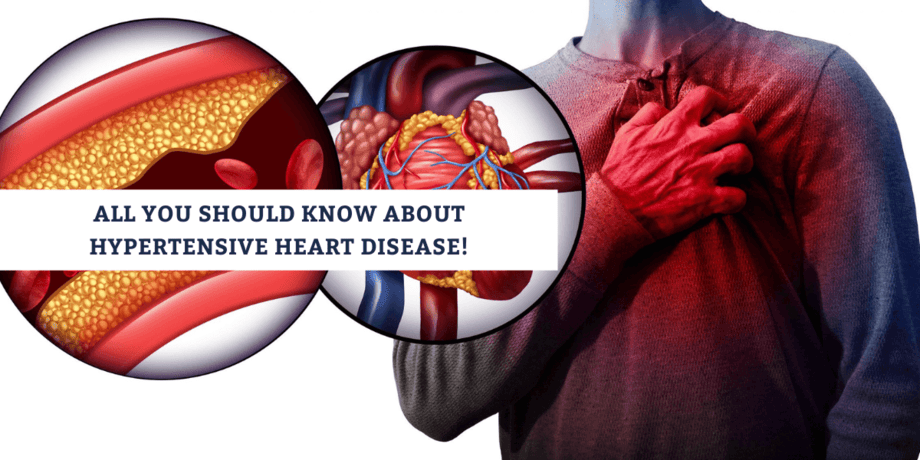What Is Hypertensive Heart Disease And Its Symptoms?

Hypertensive heart disease is a condition characterized by structural and functional abnormalities of the heart caused by long-term high blood pressure. It is a prevalent cardiovascular disorder that poses a significant burden on public health. Understanding the symptoms of hypertensive heart disease is crucial for early detection and appropriate management.
This article aims to provide an overview of the commonly observed symptoms associated with this condition. The symptoms may include:
- Chest pain and discomfort
- Shortness of breath
- Fatigue and weakness
- Swelling in the legs, ankles, and feet
- Irregular heartbeat
Identifying these symptoms promptly can aid in the timely initiation of treatment, thereby potentially reducing the risk of complications. By adopting an academic style of writing that is objective and impersonal, this article aims to provide an informative and unbiased account of hypertensive heart disease and its symptoms.
Key Takeaways
- Hypertensive heart disease is caused by high blood pressure and can lead to complications such as heart failure, stroke, or cardiac arrest.
- Prompt intervention is important in managing blood pressure levels, reducing strain on the heart, and improving overall cardiovascular health.
- Early recognition and care of hypertensive heart disease can mitigate long-term consequences and result in better outcomes and a healthier life.
- Managing blood pressure through lifestyle modifications, medications, and regular monitoring is crucial for individuals with hypertensive heart disease.
Understanding Hypertension
Hypertension, also known as high blood pressure, is a common medical condition characterized by elevated levels of pressure in the arteries. It is a chronic condition that affects a significant portion of the global population.
The causes of hypertension are multifactorial and can include genetic factors, lifestyle choices, and underlying medical conditions. Risk factors for hypertension include obesity, smoking, excessive alcohol consumption, a sedentary lifestyle, stress, and a diet high in sodium and low in potassium.
Hypertension is often asymptomatic, meaning that individuals may not experience any noticeable symptoms. However, if left untreated, hypertension can lead to serious complications such as heart disease, stroke, and kidney damage.
Therefore, it is crucial to manage hypertension through lifestyle modifications, medication, and regular monitoring to prevent the development of hypertensive heart disease.
Common Symptoms of Hypertensive Heart Disease
One of the most prevalent signs of hypertensive heart disease is the presence of blood pressure readings consistently above the normal range. This condition, also known as high blood pressure, puts excessive strain on the heart and can lead to various symptoms.
Common symptoms of hypertensive heart disease include:
- Chest pain: Patients may experience a tight or squeezing sensation in the chest, which can be a sign of angina or a heart attack.
- Shortness of breath: Due to the increased workload on the heart, individuals with hypertensive heart disease may find it difficult to breathe, especially during physical activity.
- Fatigue: Feeling tired or exhausted, even after minimal exertion, is another common symptom.
- Swelling: Fluid retention can occur, leading to swelling in the legs, ankles, or feet.
Treatment options for hypertensive heart disease typically focus on managing blood pressure levels through lifestyle changes, such as a healthy diet, regular exercise, and medication. In severe cases, surgical interventions may be required to repair or replace damaged heart valves or bypass blocked arteries.
Chest Pain and Discomfort
Chest pain and discomfort are commonly experienced by individuals with hypertensive heart disease, indicating potential angina or a heart attack. This symptom is a cause of concern as it signifies an increased risk of a heart attack. The chest pain associated with hypertensive heart disease is typically described as a tightness, pressure, or squeezing sensation. It may radiate to the left arm, jaw, or back. The causes of chest pain in hypertensive heart disease can vary, but they are primarily related to the strain on the heart due to high blood pressure. The table below provides a summary of the main causes of chest pain in hypertensive heart disease.
| Causes of Chest Pain |
|---|
| Coronary artery disease |
| Myocardial ischemia |
| Left ventricular hypertrophy |
| Aortic stenosis |
| Angina pectoris |
In conclusion, chest pain and discomfort are common symptoms of hypertensive heart disease, and they serve as a warning sign for potential angina or a heart attack. Identifying the causes of chest pain is crucial in managing and treating this condition effectively.
Shortness of Breath
Shortness of breath is a common symptom experienced by individuals with hypertensive heart disease, indicating potential complications and the need for prompt medical attention.
Hypertensive heart disease is characterized by high blood pressure that affects the heart and its surrounding blood vessels, leading to various cardiac abnormalities.
Shortness of breath, also known as dyspnea, occurs due to the impaired ability of the heart to pump blood efficiently. This can result in fluid accumulation in the lungs, causing difficulty in breathing and respiratory distress.
Individuals with hypertensive heart disease may experience shortness of breath during physical activity or even at rest.
It is important to recognize this symptom as it can be a sign of worsening heart function and the development of complications such as heart failure.
Prompt medical evaluation and management are crucial to prevent further deterioration of cardiac function and improve overall outcomes.
Fatigue and Weakness
Fatigue and weakness are debilitating symptoms often experienced by individuals with hypertensive heart disease, leaving them feeling drained and powerless in their everyday activities. These symptoms are a result of the chronic conditions associated with hypertensive heart disease, which include high blood pressure and damage to the heart muscle.
To manage these symptoms and improve overall health, lifestyle changes are crucial. Here are four important considerations:
- Regular exercise: Engaging in physical activity helps strengthen the heart muscle and improves cardiovascular health.
- Balanced diet: Consuming a diet low in sodium, saturated fats, and cholesterol can help lower blood pressure and reduce the strain on the heart.
- Medication adherence: Taking prescribed medications consistently and as directed by a healthcare professional is essential for managing hypertension and preventing complications.
- Stress management: High stress levels can contribute to elevated blood pressure. Adopting stress-reducing techniques such as meditation or yoga can be beneficial.
By implementing these lifestyle changes, individuals with hypertensive heart disease can alleviate fatigue and weakness, improving their quality of life.
Swelling in the Legs, Ankles, and Feet
Continuing from the previous subtopic, another common symptom of hypertensive heart disease is swelling in the legs, ankles, and feet, known as peripheral edema. This occurs due to fluid retention in the body, which is a result of the heart’s inability to pump blood effectively. The increased pressure in the blood vessels forces fluid out into the surrounding tissues, leading to the characteristic swelling.
Peripheral edema is often more pronounced in the lower extremities due to the effects of gravity. It can cause discomfort, difficulty in walking, and tightness in the affected areas.
It is important to note that swelling in the legs, ankles, and feet can also be a symptom of other conditions, so a medical evaluation is necessary to determine the underlying cause.
Irregular Heartbeat
Another manifestation of hypertensive heart disease involves an irregular heartbeat, characterized by a rhythm that deviates from the normal sinus pattern. This condition, known as arrhythmia, can be caused by various factors, including high blood pressure, which places excessive strain on the heart muscle. When the heart is forced to work harder to pump blood, it can lead to electrical disturbances within the heart, resulting in irregular heartbeats.
Treatment for irregular heartbeat in hypertensive heart disease aims to control blood pressure levels and manage the underlying condition. Medications such as beta-blockers and calcium channel blockers are commonly prescribed to regulate heart rhythm and reduce blood pressure. Additionally, lifestyle modifications such as maintaining a healthy weight, regular exercise, and a low-sodium diet can also play a significant role in managing the symptoms of hypertensive heart disease and reducing the risk of arrhythmias.
Importance of Early Detection and Treatment
Early detection and treatment of irregular heartbeat is crucial as it can help prevent serious complications and improve overall cardiovascular health. Timely intervention can significantly reduce the long-term effects associated with hypertensive heart disease. To emphasize the importance of early detection and treatment, consider the following list:
- Timely identification of irregular heartbeat allows for prompt medical intervention, which can help stabilize the heart’s rhythm and prevent further damage.
- Early treatment can minimize the risk of developing complications such as heart failure, stroke, or cardiac arrest.
- Prompt intervention aids in managing blood pressure levels, reducing strain on the heart, and improving overall cardiovascular health.
By recognizing irregular heartbeat early on and seeking appropriate medical care, individuals can mitigate the potential long-term consequences of hypertensive heart disease, leading to better outcomes and a healthier life.
Frequently Asked Questions
Can hypertension lead to other heart diseases?
Hypertension, if left untreated, can lead to various complications in the heart. One of these complications is hypertensive heart failure, where the heart becomes unable to pump blood efficiently, resulting in symptoms such as shortness of breath and fatigue.
What are the risk factors for developing hypertensive heart disease?
Prevention methods for hypertensive heart disease include maintaining a healthy weight, regular exercise, reducing salt intake, and managing stress. Treatment options include lifestyle modifications, medication to control blood pressure, and in severe cases, surgical interventions may be necessary.
Is hypertensive heart disease more common in men or women?
Gender differences in the prevalence of hypertensive heart disease are evident, with studies suggesting that it is more common in men than women. Hormonal factors, such as the impact of estrogen, may contribute to this disparity.
Are there any lifestyle changes that can help prevent hypertensive heart disease?
Preventive measures for hypertensive heart disease include dietary modifications such as reducing sodium intake, increasing potassium-rich foods, adopting the DASH diet, limiting alcohol consumption, maintaining a healthy weight, engaging in regular physical activity, and quitting smoking.
Can hypertensive heart disease be cured or reversed with proper treatment?
Curing or reversing hypertensive heart disease is not currently possible. However, with proper treatment, such as medication, lifestyle changes, and regular monitoring, the condition can be effectively managed to prevent further complications and improve quality of life.








